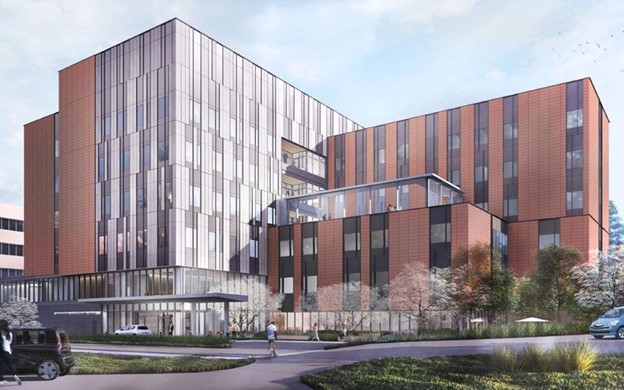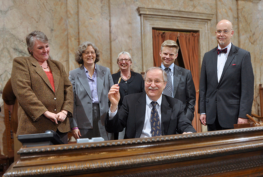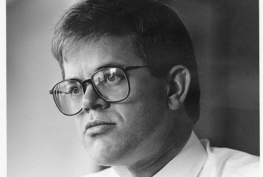Dear friends and neighbors,
Like many other states, Washington has struggled to meet the needs of people with mental health or substance use disorders, now often referred to as behavioral health. These issues touch nearly every family in one way or another, and many of you have shared your own stories of loss and recovery. For several years, we have been working to transform an outdated system by investing in more community-based treatment facilities and increasing the workforce of trained professionals. I’m hopeful that new policies and funding in this year’s budget will help more of our neighbors access the care they need.
Improving behavioral health response

One of the largest ongoing investments in our state budget is construction of the new UW Behavioral Health Teaching Facility. Slated to open next summer, it will be a one-of-a-kind facility for people struggling with serious physical and behavioral health problems. In addition to providing clinical services, it will be home for a training and workforce development program to prepare the next generation of behavioral health providers.
This year, we also worked to improve crisis response, prevent crises, and grow the behavioral health workforce. Here are a few of the highlights:
- SB 5120 creates an alternative to emergency rooms and jails for people with behavioral health needs by establishing a system for certified crisis relief centers. This new type of crisis diversion facility, based on a successful Arizona model, can provide short-term help to patients regardless of behavioral health acuity.
- HB 1134 expands the services provided through the 988 Suicide and Crisis Lifeline.
- SB 5300 allows patients to stay on medications that have kept their mental health stable.
- SB 5228 provides occupational therapy services for people with behavioral health disorders, including new clients in low-barrier housing.
- HB 1724 helps strengthen the workforce by getting qualified providers into the field as quickly and safely as possible. As demand for mental health care increases, so does the need for licensed, trained professionals.
- HB 1069 adopts the Mental Health Counselor compact, which will make it easier for behavioral health specialists from out of state to come work here.
- SB 5189 creates a certification for behavioral health support specialists who can deliver evidence-based interventions under the supervision of licensed providers.
- SB 5555 establishes a new state-certified profession of peer specialists, who have life experience valuable in providing services to people in recovery.
Drug possession laws
In 2021, the state Supreme Court struck down Washington’s felony penalty for simple drug possession, decriminalizing the possession of small amounts of drugs. The Legislature scrambled to create a temporary fix, making possession of illegal drugs a misdemeanor but requiring that police and prosecutors divert people on their first two offenses to treatment. The bill also made substantial improvements in treatment and recovery services and established a task force to determine what the policy should be when the bill was set to expire on June 30, 2023.
With the impending expiration of the 2021 law, the Legislature struggled to agree on a replacement during this year’s regular session. In May, the governor called the legislature back into special session to find a solution. Senate Bill 5536, which passed with large bipartisan majorities, sets the penalty for possession of controlled substances at a gross misdemeanor, with a maximum of 180 days in jail for each of the first two convictions, and 364 days for the third and beyond. Fines are capped at a maximum of $1,000 for a single conviction. It also creates a system for pre-trial diversion into treatment and requires mandatory early conviction vacation if a person can prove that they have completed treatment or have “substantially complied” with the recovery navigator program or similar services for six months. To address the problem of people using drugs in community spaces, the bill creates a new crime of public use of illegal drugs. Most importantly, the bill includes $63 million for treatment and support.
While I fully support the bill’s investments to help people in grip of addiction, I fundamentally disagree with using the criminal law as a solution to a health care problem. I therefore voted against the bill. I will be watching its implementation closely to make sure that the focus, as promised, is on treatment rather than punishment.
Thanks for taking the time to read my newsletter. I will continue to send weekly updates on key policies passed during this year’s legislative session. If you missed my previous updates on gun safety, reproductive freedom, public education, housing, LGBTQ+ rights, climate action, or criminal justice reform, health care, or community facilities improvements, they are available on my website. Please reach out with any questions at Jamie.Pedersen@leg.wa.gov.
Best wishes,
Jamie



